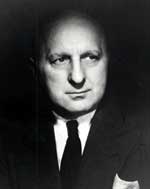

| Barney Balaban | Louis B. Mayer |
| James F. Byrnes | Dore Schary |
| Harry Cohn | "General" Nicholas Schenck |
| William Goetz | Mendel Silberberg |
| Samuel Goldwyn | Spyros Skouras |
| Eric Johnston | "Major" Albert Warner |

Brothers Barney and A. J. Balaban come from Chicago where they run a small chain of ornate movie palaces in the early 1920s; their father was a Russian immigrant grocer. Their partner is Sam Katz, with whom they ultimately form the Balaban & Katz chain. In 1926, Famous Players-Lasky (the precursor to Paramount Pictures) buys a controlling interest in Balaban & Katz. Sam Katz becomes president of Publix Theatres, which had been owned by Famous Players-Lasky, and Balaban remains president of B&K. In 1936, Balaban also became president of Paramount Pictures, a position he holds until 1966.
By 1930 the theater end is so important that the whole company name is changed to Paramount-Publix; three years later, however, in the depths of the Depression, Paramount-Publix files for bankruptcy. The reorganization is so devastating that Paramount co-founder Adolph Zukor is forced to resign by Sam Katz and becomes a pariah in Hollywood. When Balaban becomes president of Paramount in 1936, however, he re-establishes contact with Zukor and makes him chairman of the board. Touched by Balaban’s decency, Zukor thereafter calls him "the boy."
Balaban's presidency (with Y. Frank Freeman as production chief and Adolph Zukor as board chairman), sees Paramount through the Consent Decree which, in 1949, forces it to sell off its highly profitable theatres. During his remarkably long reign, he invents “Balaban's Law,” a company fiscal policy which states that, since the average film grosses $10 million, and it takes about three times a film’s cost to break even , no Paramount film could cost more than about $3 million. Part of the reasoning for that might have been Samuel Bronston's costly ($20 million) "Fall of the Roman Empire," a 1964 road show that was the "Heaven's Gate" of its day. It also became Balaban's gate, hastening his exit from the company that same year after a remarkable run.
Unlike many of his industry co-religionists, Balaban is a deeply religious Jew, not just on holidays. When asked by his daughter about his complicity with the blacklist, Balaban told her, "I don't think it's okay. There's something about it that's okay, but there's something about it that's terrible, and I don't quite understand it all yet." And at the premiere of "My Son John" -- a reactionary anti-Communist film that did not do well at the box office -- an executive from a rival studio offered Balaban congratulations, to which he replied, "I'm glad you feel that way. I wish you had made it."
Grateful acknowledgment is made to David Balaban, author of The Chicago Movie Palaces of Balaban and Katz. For more information please visit The Balaban and Katz Historical Foundation.